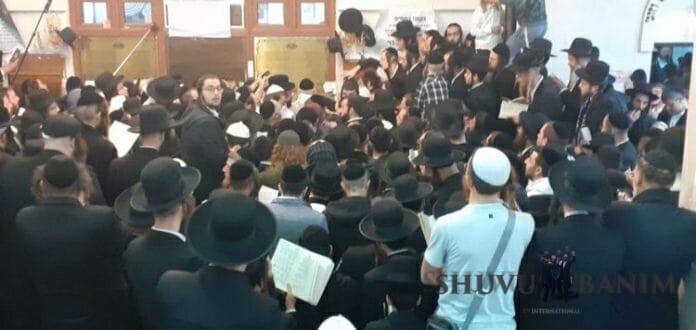The Shofar, And Confusing The Satan
The following is a translation of a shiur that appeared in the Shivivei Or Newsletter # 112, that was given over by Rabbi Eliezer Berland, shlita, in Uman, on the first day of Rosh Hashana 5780, after the Mussaf prayers (September 30, 2019).
====
Rabbenu (Rebbe Nachman of Breslov) has sealed everyone now, because there are five seals.
In the eve before Rosh Hashana, on Zchor Brit[1], this is the first ‘seal’. The ikker (main thing) is to come [to Uman] on the eve before Rosh Hashana, to be here already on motzae Shabbat[2].
Whoever wasn’t already here on motzae Shabbat, on the evening of Zchor Brit – then it’s not worth anything, as Rabbi Natan said to the people of Teplik, “For what, did you come?[3] You can return home!” Because they came after Zchor Brit, because Rabbenu takes everyone across [to a good judgment for the coming year] already, at Zchor Brit.
And after this, the second ‘seal’ is in Mussaf, and so we need to blow on the shofar, because all of the dinim, the judgments, wake up before Mussaf, and the shofar blasts nullify him [i.e. the accuser / Satan]. Each time there is a tekiah¸ a blast of the shofar, he is silenced, and he can’t speak.
And so, we blow the shofar all day long, until shkia (dusk), because this mixes-up the Satan.
For today is the day of the shofar blast (teruah) mamash!
There is a ‘day of the shofar blast’[4], and there is a ‘remembrance of the shofar blast’[5]. In Emor, this is the ‘remembrance of the shofar blast’, and in Pinchas, it’s the ‘day of the shofar blast.
There are 39 years between [the parshas of] Emor and Pinchas. Emor is the year after they left Mitzrayim (Egypt), so this is only the remembrance of the shofar blast, because they’d made the [Golden] calf, and sinned in the sin of the Meraglim (the spies), so this was only the remembrance of the shofar.
And in Pinchas, after 39 years, after all the generation of the desert had died, this is already the ‘day of the shofar blast’.
Today, is the ‘day of the shofar blast’, that mixes-up the Satan.
====
From where do we learn, that we need to blow the shofar?
Inasmuch as it’s written teruah – to blow – and teruah is to break. (Teruah translates as yibabeh, wailing and sobbing). From yibabeh, we learn that we need to blow shevarim – with each blast [of the shofar], we are breaking him (i.e. the Satan), we are saying: “Silence, katagor (prosecutor), and conquer, senigor (defender)!”
What does it mean, ‘silence, katagor’? How can we possible tell him to be quiet?! He’s got evidence, accusations in writing, and he’s putting out recordings – everything! How can we say ‘be quiet’, when everything has been photographed?
Rather, we’re saying [to the Satan] that ‘it’s YOU who caused us to sin! YOU caused all of this!’
Rabbi Natan explains that the only thing we can request as atonement today, is by way of the diminishment of the moon. Hashem says about this, ‘bring Me an atonement, that I diminished the moon.’[6] So Hashem is saying, everything is from Me. So we tell the Satan to be quiet, because he caused everything. You did everything!
And so, we need to travel to Uman, and when we get to Rabbenu, Rabbenu is the senigor (defender) [who makes all these arguments on our behalf, when the shofar is being blown.]
====
FOOTNOTES:
[1] This is the last day of Elul, leading into Rosh Hashana on the first of Tishrei. Zchor Brit takes places during the selichot service on the last night of Elul, that lead into the shacharit prayers.
[2] This year, Rosh Hashana began on Sunday evening.
[3] Translated from Siach Sarfey Kodesh: “Once, when Rosh Hashana fell out on Monday night, the [Breslov] people of Teplik were aroused to travel to Uman on motzae Shabbat kodesh. They [decided that they] would say the selichot service of erev Rosh Hashana that’s called ‘Zchor Brit’ together, in the village of Palanka, that was close to Uman.
The majority of the Breslovers from the other cities had already proceeded on [to Uman] already for that Shabbat, in order to be able to also recite the selichot service in Uman.
When the people from Teplik showed up, Moharanat (Rabbi Natan) chided them, and said to them: “If this is how you act in regards to coming for Rosh Hashana, then it’s better not to come!” Moharanat nicknamed the people from Teplik as: ‘Teplikers, baalei batim’ (lit: ‘house owners, but the meaning is people who are more engaged in the affairs of this world, than in spiritual matters) – even though they were serious servants of Hashem.”
[4] Parshat Pinchas, 29:1
[5] Parshat Emor, 23:24
[6] See the Gemara, Tractate Chullin 60b: The moon and the sun used to be the same size. The moon came and complained about this to Hashem, hoping that He would diminish the sun. Instead, He diminished the moon – but then as a form of consolation and ‘atonement’ for doing this, Hashem commanded the Jews to sanctify the first day of Rosh Chodesh, i.e. the day marking the new moon, and the beginning of the next lunar cycle of waxing and waning.

















